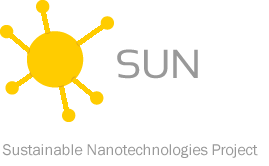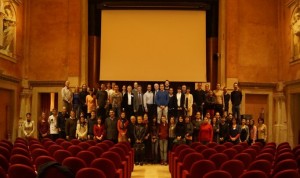The SUN project has successfully hosted the first Sustainable Nanotechnology School, which was attended by over 70 participants coming from all around Europe as well as United States and Brazil. These participants were exposed to 21 of the most prominent experts working in the fields of environmental, health and safety (EHS) risks and industrial applications of nanomaterials. Commercial products containing nanomaterials were the protagonists of the lessons: They promise innovations but also pose questions regarding their effects on humans and ecosystems.
“Imagine a new nanotechnology for the treatment of cancer, which would cause damage to the environment” – says Igor Linkov, professor at Carnegie Mellon University and a senior scientist at the US Army Engineering Research and Development Centre –“Nanomaterials can potentially revolutionize medicine, but their impact on the environment is unknown and so the question is: How do we balance the risks of nanotechnologies with their economic and social benefits, taking into account the interests of their developers, producers, end-users and the general public?”
The attendees of the School had the opportunity to find answers to this question thanks to the experience of scientists who have long worked in the research field. Among the speakers were Antonio Marcomini, director of the Department of Environmental Sciences, Informatics & Statistics, hosting the school at University Ca’ Foscari Venice as well as Georgios Katalagarianakis and Hugues Crutzen, who represented the European Commission.
Organized by the major European FP7 projects SUN (Sustainable Nanotechnologies), GUIDEnano, MARINA, and the MODENA Cost Action, the School proofed not only a very successful collaboration among these initiatives, but also gave the participating young researchers a chance to learn from the experience of leading experts in the field.
One of these experts is Danail Hristozov, the Principal Investigator of the EU FP7 SUN project, who commented:
“The current uncertainties around the EHS risks of nanomaterials are raising societal concerns that can block the benefits from nanotechnologies. The introduction of unsafe nanoproducts to the market can cause over-balancing regulations and demolished consumer confidence. In order to avoid future liabilities, sound scientific analysis of the EHS risks of nanomaterial is required, taking into consideration all stages of their life cycles. This is the only way to protect the safety of workers, downstream users, consumers, ecosystems, and the general public. In this context, there is a growing demand across both the public and private sectors for nano-EHS research experts. This school aims to contribute to the training of this new generation of creative and innovative young researchers, able to face the above challenges and to convert the resulting multidisciplinary knowledge and ideas into products and services for economic and social benefit”.
The scientific community in the field of nanotechnology sustainability will gather again in Venice for two other important events. The first will be the Sustainable Nanotechnology Conference 2015, organized by the projects SUN and GUIDEnano and the US Sustainable Nanotechnology Organization on 9-11 March 2015. After that, on 12-13 March 2015, a workshop of the EU-US Communities Of Research: Bridging Nano-EHS Research Efforts will be hosted by SUN at University Ca’ Foscari Venice. This two-day workshop is co-organised and supported by the US National Nanotechnology Initiative and the European Commission.

